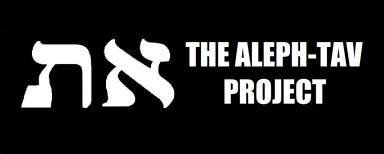
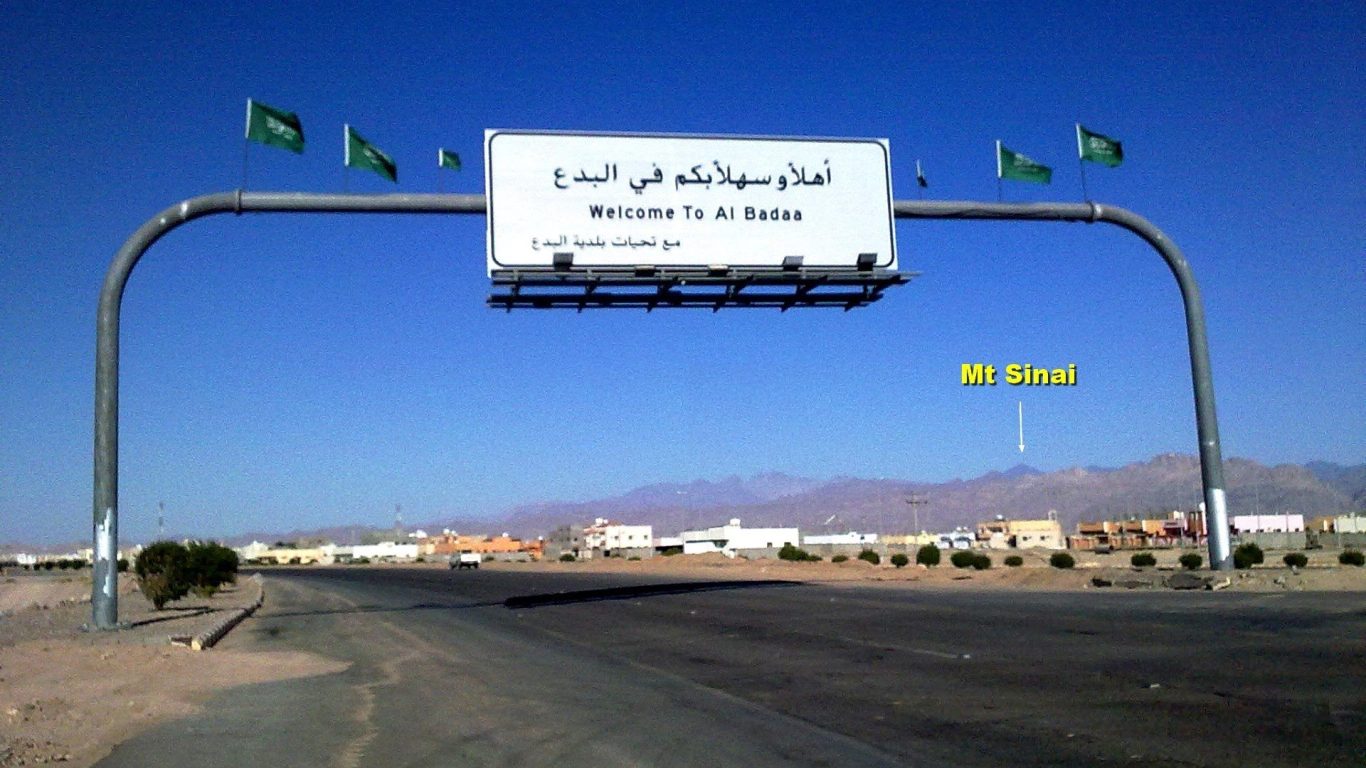

NOTE: All of the yous and yours underlined as "you" and "your" indicates that the you and the your are plural. Also any of the words that are in pink lettering as "you" refers to the feminine gender, but it is only applied when it does not commonly refer to a woman. This only is applied to this week's Torah portion text at this time.
CHAPTER 18
Exodus 18:1-27
Exo 18:1 And Jethro, priest of Midian, father-in-law of Moses, heard of את all which Elohim did for Moses and for Israel, his people, for יהוה had brought out את-Israel from Egypt; 2 And Jethro, father-in-law of Moses, took את-Zipporah, woman (wife) of Moses, after sending her away, 3 and את her two sons; which the name of the one was Gershom; for had said, I have become a sojourner (stranger) in a foreign land: 4 And the name of the one was Eliezer; for the Elohim of my father was among my help, and delivered me from the sword of Pharaoh:
5 And Jethro, father-in-law of Moses, and his sons, and his woman (wife), came to Moses to the wilderness which he camped there at the Mountain of The Elohim: 6 And said to Moses, I, your father-in-law, Jethro, have come to you, and your woman (wife), and her two sons with her. 7 And Moses went out to encounter meet (encounter) his father-in-law, and bowed, and kissed to him; and they asked a man for the peace (welfare) to his neighbor; And they came to the tent.
8 And Moses accounted (enumerated, enrolled, scrolled, numbered) to his father-in-law את all whch יהוה did to Pharaoh and to Egypt upon the occasions (sake, concern, pokings) of Israel, and את all of the weariness (trouble, travail, distress) which had found them among the way, and יהוה delivered them. 9 And Jethro was joined (united?) over (upon) all of the goodness which יהוה had done to Israel which He had delivered from the hand of Egypt. 10 And Jethro said, Blessed be יהוה which has delivered you from the hand of Egypt and from the hand of Pharaoh which delivered את-the People from under the hand of Egypt. 11 Now I know for יהוה is greater than all of the elohim: For in the word which they were proud upon (over, above) them. 12 And Jethro, father-in-law of Moses, took an Elevation Offering (Ascension Offering, Burnt Offering) and Sacrifices to Elohim: And Aaron and all of the Elders of Israel came to eat bread with the father-in-law of Moses to the face of The Elohim.
13 And was from the morrow, and Moses sat to judge (ordinate) את-the People: and the People stood upon (over) Moses from the breaking period (morning) unto the mixing period (evening). 14 And the father-in-law of Moses saw את all which he was doing to the People, and said, What is this word which you are doing to the people? Why were you sitting by your aloneness, and all of the people were standing upon (over) you from breaking period (morning) unto mixing period (evening)? 15 And Moses said to his father-in-law, For the People have come to me to seek (inquire) Elohim: 16 For a word shall be to them, have come to me; and I judge (ordinate) between a man and between his neighbor, and I make known את-the Statutes of The Elohim, and את-His Teachings (Torahs).
17 And the father-in-law of Moses said to him, The word which you are doing is not good. 18 Wearing (Fainting), you will wear out (faint), also you, also this People which are with you: for the word is heavy with (from) you; You are not able to do him by your aloneness. 19 Now listen in my voice. I will counsel (consult, advise) you, and Elohim shall be with you: You will be for the People opposite (at the front of, a circumcision of) The Elohim, and you, you will bring את-the words to The Elohim: 20 And you shall delegate (admonish, enlighten, warn) them את-the Statutes and את-the Teachings (Torahs), and you shall make known to them את-the way they shall walk (go) in her and את-the doings (work) which they should do. 21 And you, you shall provide (perceive, envision, gaze) from all of the People men of valor (valiance), revering (aweing, fearing) Elohim, men of truth, haters of gain (profit, covetousness, unjust gain); and you will set over (upon) them of princes of thousands, princes of hundreds, princes of fifties, and princes of tens: 22 And they will judge את-the People in all times: And shall be, they shall bring (come) to you any of the great word, and any of the small word they, they shall judge (ordinate): And shall be easier (lighter) from upon yourself, and they shall bear (carry, lift up) with you. 23 If you do את-this word, and Elohim commands you, and you shall be able at standing, and also all of this People shall go over (upon) their place in peace.
24 And Moses listened to the voice of his father-in-law, and did all which was said. 25 And Moses chose men of valor (valiance) from all of Israel, and gave them of heads over (upon) the People, of princes of Thousands, of princes of Hundreds, of princes of Fifties, and of princes of Tens. 26 And they judged (ordinated) את-the People in all times: They brought to Moses את-the hard (severe, fierce) word, and they judged (ordinated) themselves any of the small word. 27 And Moses sent away את-his father-in-law; and went by himself to his land.
(NOTE: Not all verses will have comments)
Verses one through six
JETHRO AT MOUNT SINAI
FIRST DAY: DAYTIME
1 And Jethro, priest of Midian, father-in-law of Moses, heard of את all which Elohim did for Moses and for Israel, his people, for יהוה had brought out את-Israel from Egypt; 2 And Jethro, father-in-law of Moses, took את-Zipporah, woman (wife) of Moses, after sending her away, 3 and את her two sons; which the name of the one was Gershom; for had said, I have become a sojourner (stranger) in a foreign land: 4 And the name of the one was Eliezer; for the Elohim of my father was among my help, and delivered me from the sword of Pharaoh: 5 And Jethro, father-in-law of Moses, and his sons, and his woman (wife), came to Moses to the wilderness which he camped there at the Mountain of The Elohim: 6 And said to Moses, I, your father-in-law, Jethro, have come to you, and your woman (wife), and her two sons with her.
This is the first day of Jethro's arrival to Mount Sinai, and he heard of all that יהוה did for Moses. The word of Moses and the Israelites somehow reached to him, but it is not known when. There is no mention when in time Jethro met Moses at Mount Sinai. It is probable that it was the same day when Moses was told the People to prepare in three days before יהוה came down onto the mountain to speak the Ten Words (Commandments), which I will reveal later in this week's Torah portion.
Question: "When did Moses send his family back to Midian"? The best theory I can figure is based in the Torah portion of Sh'moth, in the book of Exodus
Exodus 4:24 And was on the way in the lodging place, and יהוה confronted (contacted, concurred) him, and sought the death of him [(at having him die)]. 25 And Zipporah, she took a sharp stone (flint stone, knife), and she cut off את-the foreskin of her son, and she made touch (smitten) to his feet, and she said, For a bridegroom of bloods you are to me, 26 and forsook (slackened, ceased, abated) from him: Then said of her, A bridegroom of bloods for the circumcision.
This would have most likely been the location where Moses returned Zipporah and his two sons back to Jethro, or Zipporah self-volunteered to return with the children to Jethro. Either way, Zipporah returned at this archived account moment. Also, based on this account, it was probable that when they were at their home, when the son was born, Zipporah resented circumcising their son.
Anyone wondered how Zipporah knew to circumcise their son? Out of all those who circumcised, Zipporah was the only female to be recorded to do it. How did she know how to do it? There are a couple of possibilities:
Possibility Number One: Moses kept contacts with his Hebrew People during his life as a prince in Egypt, and somehow observed the circumcision acts of the newborn males. When he left for Midian, married Zipporah, and had their firstborn child, Gershom, Moses circumcised their son and explained it to Zipporah regarding the Covenant of Abraham. But when Eliezer was born, either Zipporah told him not to circumcise their son, or Moses didn't do it and was too lazy.
Possibility Number Two: When Moses went to Midian, married Zipporah and had their first child, Gershom, Zipporah's father, Reuel/Jethro, was a priest in Midian. Since Midian was a descendant of Abraham, through his third wife, Keturah, as noted earlier, Reuel/Jethro kept the Abrahamic Covenant of the Circumcision. Since he was priest in Midian, he would had most likely been the one in charge of the circumcision activities, and throughout the years. And Zipporah could have observed her father's circumcision ceremonies at times when she had free time and saw her father's act to do the circumcision rituals and knew how to do it through her observations.
Either way, Zipporah knew how to circumcise, and she did it to keep her husband alive. Afterwards she was really upset with him, that she decided to go back home and take their sons with her. How thinskinned she was.
Moses probably debated with Zipporah about the need to circumcise their son, but after talking, Moses gave in to his wife.
When Moses and his family arrived at the lodging place, the Messenger of יהוה pursued Moses to kill him, possibly for giving in to his wife. That was why Zipporah was angry with Moses and blamed him for forcing her hand to circumcise their son. Now thinking about it, this is the first and only time in Biblical history that a female did any circumcision on a male baby, because only the men did that.
After the issue with the circumcision of one of Moses' two sons, Moses and Zipporah might have had an argument, and Moses decided for his family for them to stay at the lodging place until his son recuperated from the circumcision and they returned to Jethro. Then afterward, יהוה told Aaron to meet Moses, which they did at Mount Sinai.
In verse three of this week's Torah portion passage, it says that Gershom and Eliezer were "her two sons". Why didn't it mention that they were also Moses' sons? In the account of the Sh'moth passage mentioned above, in the incident of Zipporah's act of circumcision, it also says "her son". It did not say "their son". In verse five of this week's Torah portion passage, it states that Jethro came with "his sons", meaning Moses' sons. Then in verse six of this week's Torah portion passage, Jethro states to Moses' that the sons were "her sons". Why this alternations of "him" and "her"- more "her" than "him"? I don't have answer to that at this time.
Looking at the following words:
JETHRO
The Hebrew word for Jethro is "Yeeth-roh"- Yod, Tav, Resh, Vav (יתרו). It is from Strong's Concordance number 3503, and its definition
From H3499 with pronominal suffix; his excellence; Jethro, Moses’ father in law: - Jethro. Compare H3500.
from 3499 "yeh-thehr" (יתר), and its defintion
Properly an overhanging, that is, (by implication) an excess, superiority, remainder; also a small rope (as hanging free): - + abundant, cord, exceeding, excellency (-ent), what they leave, that hath left, plentifully, remnant, residue, rest, string, with.
Jethro, in this relevence, means "remnant", meaning יהוה brought out "his remnant" from Egypt.
ZIPPORAH
The Hebrew word for Zipporah is "Tseep-poh-rah"- Tsade, Peh, Resh, Heh (צפרה). It is from Strong's Concordance number 6855, and its defintion
Feminine of H6833; bird; tsipporah, Moses’ wife: - Zipporah.
from 6833 "tseep-pohr" (צפר), and its definition
From H6852; a little bird (as hopping): - bird, fowl, sparrow.
from 6852 "tsah-phahr" (צפר), and its definition
A primitive root; to skip about, that is, return: - depart early.
Zipporah means "bird", but it also translates "return" which Zipporah "returned" to Moses at Mount Sinai.
GERSHOM
The Hebrew word for Gershom is "Geyr-shohm"- Gimel, Resh, Shin, Mem Sophit (גרשם). It is from Strong's Concordance number 1647, and its definition
For H1648; Gereshom, the name of four Israelites: - Gershom.
from 1648, "geyr-shohm" (גרשום), and its definition
From H1644; a refugee; Gereshon or Gereshom, an Israelite: - Gershon, Gershom.
from 1644 "gah-rash" (גרש), and its definition
A primitive root; to drive out from a possession; especially to expatriate or divorce: - cast up (out), divorced (woman), drive away (forth, out), expel, X surely put away, trouble, thrust out.
Gershom means "stranger".
ELIEZER
The Hebrew word for Eliezer is "Eh-lee-eh-zehr"- Aleph, Lamed, Yod, Ayin, Zayin, Resh (אליעזר). It is from Strong's Concordance number 461, and its definition
From H410 and H5828; God of help; Eliezer, the name of a Damascene and of ten Israelites: - Eliezer.
El
Go to Reuel's name above to get the definition
El means "El".
Ezer
from 5828 "ey-zehr" (עזר), and its definition
From H5826; aid: - help.
from 5826 "ah-zahr" (עזר), and its definition
A primitive root; to surround, that is, protect or aid: - help, succour.
Ezer means "help".
Eliezer means "El is My Help".
Putting the meaning of the three names together including Moses, meaning "drawn out", and Jethro, this could be put into a phrase:
"The remnant are departed early by the returning refugee, who is the El of my help"
The "Returning Refugee" is Yeshua, who will draw us, the remnant, out from the judgment of this world, and He will have us depart early to be with Him, which is based in the apostle Paul's letter to the assembly in Thessalonica
1 Thessalonians 4:13 But I would not have you to be ignorant, brethren, concerning them which are asleep, that ye sorrow not, even as others which have no hope. 14 For if we believe that Yeshua died and rose again, even so them also which sleep in Yeshua will the Adon bring with him. 15 For this we say unto you by the Word of the Adon, that we which are alive and remain unto the coming of the Adon shall not prevent them which are asleep. 16 For the Adon himself shall descend from the Heavens with a shout, with the voice of the archangel, and with the Shofar (Trump) of hwhy: and the dead in Messiah shall rise first: 17 Then we which are alive and remain shall be caught up together with them in the clouds, to meet the Adon in the air: and so shall we ever be with the Adon. 18 Wherefore comfort one another with these words.
There is a pattern in Moses sons' names and meanings. Moses firstborn, Gershom, represents Moses' life as a sojourner in the land, and his second born, Eliezer, represents Moses looking to El is my help. Notice that the first son is more or less a negative meaning and the second born is a positive meaning.
In comparison, there is another account of a father bearing two sons with the similar matters and patterns, which is noted in the Torah portion of Mikeyts, in the book of Genesis
Genesis 41:50 And to Joseph were birthed two sons, before she came the years of the famine, which Asenath, daughter of Poti Pherah, Priest of On, birthed her to him. 51 And Joseph called את-the name of the firstborn, Manasseh: For Elohim made me forget את-all of my toil (worries, weariness), and את all of the house of my father. 52 And called את the name of the second, Ephraim: For Elohim has fructified me in the land of my affliction.
Joseph's first born's name Manasseh, meaning to forget, was more or less a negative meaning, and his second born son, Ephraim, meaning fruitful, is a positive meaning, just like the matters and patterns of Moses' sons.
Verse seven
7 And Moses went out to encounter meet (encounter) his father-in-law, and bowed, and kissed to him; and they asked a man for the peace (welfare) to his neighbor; And they came to the tent.
Uh, what about Moses' wife and sons? Why didn't he ask them of their welfare? Why didn't Moses kiss his wife and his sons? Didn't Moses care about his children? Was there a disconnect between he and his sons? It was not as if Moses was away for many years, for it was approximately, at most, one year since he last saw them. There must have still been a riff between Moses and Zipporah that still was not settled regarding the circumcision account.
Verse eight
8 And Moses accounted (enumerated, enrolled, scrolled, numbered) to his father-in-law את all whch יהוה did to Pharaoh and to Egypt upon the occasions (sake, concern, pokings) of Israel, and את all of the weariness (trouble, travail, distress) which had found them among the way, and יהוה delivered them.
It is like Jacob telling Laban in Padan Aram saying that everything happened to him back in Hebron, which is noted in the Torah portion of Vay-Yeytsey, in the book of Genesis
Genesis 29:13 And was, as Laban heard את-the hearing (report) of Jacob, son of his sister, and ran to meet (encounter) him, and embraced to him, and kissed to him, and brought him to his house. And accounted (recorded, enumerated, scrolled) to Laban את all of these words.
It's all in the blabber mouthing family.
Verses nine through twelve
9 And Jethro was joined (united?) over (upon) all of the goodness which יהוה had done to Israel which He had delivered from the hand of Egypt. 10 And Jethro said, Blessed be יהוה which has delivered you from the hand of Egypt and from the hand of Pharaoh which delivered את-the People from under the hand of Egypt. 11 Now I know for יהוה is greater than all of the elohim: For in the word which they were proud upon (over, above) them. 12 And Jethro, father-in-law of Moses, took an Elevation Offering (Ascension Offering, Burnt Offering) and Sacrifices to Elohim: And Aaron and all of the Elders of Israel came to eat bread with the father-in-law of Moses to the face of The Elohim.
Jethro recognized that יהוה is the Elohim from the stories he had heard from sources, and noted it to Moses. Jethro made an Elevation Offering to show his dedication and acknowledgment to יהוה, and fulfilled it through the Food Covenant by eating bread with Moses, Aaron and the Elders of Israel before יהוה. What a sight that must have been. This should be a scene for a movie in which directors should stick to the Biblical text.
Verse thirteen
JETHRO AT MOUNT SINAI
SECOND DAY: MORNING
13 And was from the morrow, and Moses sat to judge (ordinate) את-the People: and the People stood upon (over) Moses from the breaking period (morning) unto the mixing period (evening).
Anyone want Moses' job? Moses took all of the day to hear case after case. How did he take a lunch break? By the end of this verse, it took the time line to the end of the second day of Jethro's visit.
Verses fourteen through sixteen
JETHRO AT MOUNT SINAI
THIRD DAY: EARLY DURING THE NIGHT
14 And the father-in-law of Moses saw את all which he was doing to the People, and said, What is this word which you are doing to the people? Why were you sitting by your aloneness, and all of the people were standing upon (over) you from breaking period (morning) unto mixing period (evening)? 15 And Moses said to his father-in-law, For the People have come to me to seek (inquire) Elohim: 16 For a word shall be to them, have come to me; and I judge (ordinate) between a man and between his neighbor, and I make known את-the Statutes of The Elohim, and את-His Teachings (Torahs).
This is Jethro, being a true father to Moses, playing another role, and his role is based on the meanings of Jethro's name, which noted earlier means "excellence" and "superiority" regarding Moses' way of handling the matters toward the people all day long. It shows a side of Jethro that he cared about his son-in-law. I wished Zipporah would show that she cared for her husband as well.
Verses seventeen and eighteen
17 And the father-in-law of Moses said to him, The word which you are doing is not good. 18 Wearing (Fainting), you will wear out (faint), also you, also this People which are with you: for the word is heavy from (with) you; You are not able to do him by your aloneness.
This is Jethro's response in his role play based on the "excellence" of his observation toward Moses, which I will show in a moment.
In verse eighteen of this week's Torah portion passage, It is probable the phrase that Jethro said to Moses, "...for the word is heavy from (with) you;...", is the phrase Edward G. Robinson, playing Dathan in The Ten Commandments movie, said to Moses at Mount Sinai by saying "You take too much upon yourself". The script writer took Jethro's words and applied it to Dathan instead. Jethro should have sued Cecil B. DeMille for copyright infringment. :)
Notice that in verse eighteen of this week's Torah portion passage that the word "you" is bold in pink. In the Hebrew text, the you is in the feminine gender which tells us that Jethro, Moses' father-in-law, was speaking to Moses' "soul", in which the soul, whether of a man or of a woman is "feminine".
Verses nineteen and twenty
19 Now listen in my voice. I will counsel (consult, advise) you, and Elohim shall be with you: You will be for the People opposite (at the front of, a circumcision of) The Elohim, and you, you will bring את-the words to The Elohim: 20 And you shall delegate (admonish, enlighten, warn) them את-the Statutes and את-the Teachings (Torahs), and you shall make known to them את-the way they shall walk (go) in her and את-the doings (work) which they should do.
Jethro continues with the other meaning of his name
Looking at the word JETHRO
The Hebrew word for Jethro is "Yeeth-roh"- Yod, Tav, Resh, Vav (יתרו). It is from Strong's Concordance number 3503, and its definition
From H3499 with pronominal suffix; his excellence; Jethro, Moses’ father in law: - Jethro. Compare H3500.
from 3499 "yeh-thehr" (יתר), and its defintion
Properly an overhanging, that is, (by implication) an excess, superiority, remainder; also a small rope (as hanging free): - + abundant, cord, exceeding, excellency (-ent), what they leave, that hath left, plentifully, remnant, residue, rest, string, with.
Jethro was giving his "excellence" and "superiority"- through his counsel to Moses.
The first Aleph-Tav is next to the phrase "the way". This phrase is noted in the Gospel of John
John 14:4 And whither I go ye know, and the way ye know. 5 Thomas saith unto him, Lord, we know not whither thou goest; and how can we know the way? 6 Yeshua saith unto him, I am the Way...
Yeshua revealed to them that He, the Aleph and the Tav, is "the Way".
The second Aleph-Tav is next to the phrase "the work". This phrase is also noted in the Gospel of John
John 4:34 Yeshua saith unto them, My Meat is to do the Will of Him that sent Me, and to finish His Work.
John 6:29 Yeshua answered and said unto them, This is the Work of יהוה, that ye believe on Him whom He hath sent.
John 9:4 I must work the Works of Him that sent Me, while it is day: the night cometh, when no man can work.
John 17:4 I have glorified Thee on the earth: I have finished the Work which Thou gavest Me to do.
Yeshua is the Aleph and the Tav who is "the Work", which was "the Father's Work".
Also, in the first century, there is notion that the believers of Yeshua were called "Followers of The Way".
Notice that in verse nineteen of this week's Torah portion passage that the word "you" is bold in pink. In the Hebrew text, the you is in the feminine gender which tells us that Jethro was speaking to Moses' "soul", in which the soul, whether of a man or of a woman is "feminine". It means that Jethro is saying to Moses that Elohim will be with his "soul".
Verses twenty-one through twenty three
21 And you, you shall provide (perceive, envision, gaze) from all of the People men of valor (valiance), revering (aweing, fearing) Elohim, men of truth, haters of gain (profit, covetousness, unjust gain); and you will set over (upon) them of princes of thousands, princes of hundreds, princes of fifties, and princes of tens: 22 And they will judge את-the People in all times: And shall be, they shall bring (come) to you any of the great word, and any of the small word they, they shall judge (ordinate): And shall be easier (lighter) from upon yourself, and they shall bear (carry, lift up) with you. 23 If you do את-this word, and Elohim commands you, and you shall be able at standing, and also all of this People shall go over (upon) their place in peace.
In other words, Moses was to set different levels of authority to hear cases. This is just like the United States judicial system, or so it is supposed to be. Nevertheless, we have a local court, followed by a District or County Court, then a state court, then a Federal Circut court, and finally the Supreme Court. These U.S. courts were based on the rulers of thousands, hundreds, fifties and tens. It has been working that way, more or less, for a long time, until the U.S. went overboard with the system saying "We will take it all the way to the Supreme Court, no matter what the results are from the lower courts". This is an act of abuse of the Judicial system.
Indirectly related, this principle of the princes of thousands, hundreds, fifties and tens was used during Yeshua's life, which is noted in the Gospel of Mark
Mark 6:34 And Yeshua, when He came out, saw much people, and was moved with compassion toward them, because they were as sheep not having a shepherd: and He began to teach them many things. 35 And when the day was now far spent, His disciples came unto Him, and said, This is a desert place, and now the time is far passed: 36 Send them away, that they may go into the country round about, and into the villages, and buy themselves bread: for they have nothing to eat. 37 He answered and said unto them, Give ye them to eat. And they say unto Him, Shall we go and buy two hundred pennyworth of bread, and give them to eat? 38 He saith unto them, How many loaves have ye? Go and see. And when they knew, they say, Five, and two fishes. 39 And He commanded them to make all sit down by companies upon the green grass. 40 And they sat down in ranks, by hundreds, and by fifties. 41 And when He had taken the five loaves and the two fishes, He looked up to the heavens, and blessed, and brake the loaves, and gave them to His disciples to set before them; and the two fishes divided he among them all. 42 And they did all eat, and were filled. 43 And they took up twelve baskets full of the fragments, and of the fishes. 44 And they that did eat of the loaves were about five thousand men.
Yeshua honored the basis of Jethro's suggestion that Moses honored through separating the people into groups of hundreds and fifties.
Notice that in verse twenty two of this week's Torah portion passage that the word "you" is bold in pink. In the Hebrew text, the you is in the feminine gender which tells us that Jethro was speaking to Moses' "soul", in which the soul, whether of a man or of a woman is "feminine". What it tells us is Jethro was saying to Moses that the various rulers will bear Moses' "soul". We as believers in Yeshua are bearing Yeshua's "Soul" via the Ruakh HaKodesh (the Holy Spirit) in doing His Work.
!!!כבד לך יהוה
Verses twenty four through twenty six
24 And Moses listened to the voice of his father-in-law, and did all which was said. 25 And Moses chose men of valor (valiance) from all of Israel, and gave them of heads over (upon) the People, of princes of Thousands, of princes of Hundreds, of princes of Fifties, and of princes of Tens. 26 And they judged (ordinated) את-the People in all times: They brought to Moses את-the hard (severe, fierce) word, and they judged (ordinated) themselves any of the small word.
There were two different matter later in the Torah of hard cases that came to Moses. One matter was the case of a father having no male heirs, which is noted in the Torah portion of Pinkhas, in the book of Numbers
Numbers 27:1 And the daughters of Zelophehad, son of Hepher, son of Gilead, son of Machir, son of Manasseh, of the family of Manasseh, son of Joseph, they came near: and these are the names of his daughters; Mahlah, Noah, and Hoglah, and Milcah, and Tirzah. 2 And they stood to the face of Moses, and to the face of Eleazar, the Priest, and to the face of the Rulers and all of the Congregation, at the Entrance of the Tent of Appointment, to say, 3 Our father died in the wilderness, and he was not in the midst of the Congregation that were appointed upon (over) יהוה in the congregation of Korah; that had died in his sin, and there were no sons to him. 4 To why should the name of our father be scraped away (shaved away) from the midst of his family, for was not to him a son?! Give to us a possession (seize) among the midst of the brothers of our father. 5 And Moses brought near את-their charge (cause, custom issue) to the Face of יהוה.
6 And יהוה spoke to Moses, to say, 7 Thus the daughters of Zelophehad had spoken: Giving, you shall give to them a scraping (shaving) of an inheritance in the midst of the brothers of their father; and you shall have את-the inheritance of their father go over to them. 8 And you shall speak to the Sons of Israel, to say, When a man shall die, and has not a son to him, And you shall have את-his inheritance go over to his daughter. 9 And if has not a daughter to him, and you shall give את-his inheritance to his brother. 10 And if has not to him brothers, and you shall give את-his inheritance to the brother of his father. 11 And if have no brothers to his father, and you shall give את-his inheritance to his relative that is near to him from his family, and shall possess her: and she shall be to the Sons of Israel for a Statute of Judgment, as the which יהוה commanded את-Moses.
Another matter was a follow-up case regarding daughters being heirs of one tribe potentially marrying a man from another tribe and the tribe losing that part of the territory, which is noted in the Torah portion of Masei, in the book of Numbers
Numbers 36:1 And came near the heads of the fathers of the families of the sons of Gilead, son of Machir, son of Manasseh, from the families of the sons of Joseph, and they spoke to the face of Moses, and to the face of the Rulers, the Heads of the Fathers of the Sons of Israel: 2 and they said, יהוה commanded את-my lord (master) to give את-the land among an inheritance on the lot to the Sons of Israel: and my lord (master) was commanded on יהוה to give את-the inheritance of Zelophehad, our brother, to his daughters. 3 And they shall be to one from the sons of the tribes of the Sons of Israel for wives, and their inheritance shall be scraped away (shaved away, removed) from the inheritance of our fathers, and shall be added upon the inheritance of the tribe which they shall belong to them: and our inheritance from the lot shall be scraped away (shaved away, removed). 4 And if the Jubilee shall be to the Sons of Israel, and their inheritance shall be added upon the inheritance of the tribe which they shall belong to them: and from the inheritance of the tribe of our fathers, their inheritance shall be scraped away (shaved away, removed). 5 And Moses commanded את-the Sons of Israel upon (over) the Mouth of יהוה, to say, Thus, the tribe of the sons of Joseph speaks. 6 This is the Word which יהוה commanded to the daughters of Zelophehad, to say, For the goodness in their eyes, they shall surely (only) be wives to the family of the tribe of their father, they shall be for wives. 7 And she shall not circumvent (revolve) the inheritance of the Sons of Israel from tribe to tribe: for a man of the Sons of Israel shall cling on the inheritance of the tribe of his fathers, 8 and any daughter possessing an inheritance from the tribes of the Sons of Israel, she shall be for a wife to one from the families of the tribe of her father, by that, the Sons of Israel, they shall possess a man an inheritance of his fathers. 9 and she shall not circumvent (revolve) the inheritance from a tribe to another tribe, for the tribes of the Sons of Israel, they shall cling a man on his inheritance. 10 As the which יהוה commanded את-Moses, so the daughters of Zelophehad, they did: 11 And Mahlah, Tirzah, and Hoglah, and Milcah, and Noah, the daughters of Zelophehad, they were for wives to the sons of their uncles (father brothers): 12 they were for wives with the families of the sons of Manasseh, son of Joseph. and she was their inheritance upon (over) the tribe of the family of their father. 13 These are the Commandments and the Judgments, which יהוה commanded on the hand of Moses to the Sons of Israel, in the plains (going overs) of Moab, upon Jordan at Jericho [(Jordan-Jericho)].
Verse twenty seven
JETHRO AT MOUNT SINAI
THIRD DAY: DURING THE EARLY MORNING
27 And Moses sent away את-his father-in-law; and went by himself to his land.
Jethro stayed three days with Moses at Mount Sinai before returning to his land. As noted earlier, there is a strong probability that the duration of Jethro's stay with Moses was the same three days time that the Sons of Israel were told to sanctify themselves for the third day that יהוה was to come down on Mount Sinai, which I will note later.
At times, we in Messiah need some Jethros in our lives to give us some "experience" and expertise to better our lives, and make our lives easier, so that we don't wear ourselves out.
CHAPTER 19
Exodus 19:1-25
Exo 19:1 In the third renewed month, on this day to the going out of the Sons of Israel from the land of Egypt, they came at the Wilderness of Sinai. 2 And they journeyed (pulled up) from Rephidim, and they came at the Wilderness of Sinai, and they camped at the wilderness; and Israel camped there before (at the front of) the Mountain. 3 And Moses ascended her to The Elohim, and יהוה called to him from the mountain, to say, Thus you shall say to the House of Jacob, and you shall tell (declare) to the Sons of Israel; 4 You, you have seen which I did to Egypt, and I have bore (carried, lifted up) you upon wings of eagles, and I brought you to Me. 5 And now, if listening, you will listen in My Voice, and you will guard (observe, heed) את-My Covenant, and you shall be to Me a Special Treasure (Jewel, Peculiar Treasure) from all of the peoples: for all of the Earth belongs to Me: 6 And you, you shall be to Me a Kingdom of Priests, and a Sacred (Holy) Nation. These are the Words which you shall speak to the Sons of Israel.
7 And Moses came and called to the Elders of the People, and put (set) to their faces את all of these Words which יהוה commanded him. 8 And all of the People, they answered together, and they said, All which יהוה has spoken we will do [(We will do all which יהוה has spoken)]. And Moses returned את-the words of the People to יהוה.
9 And יהוה said to Moses, Behold, I will come to you in a Thick (Dense, Dark) Cloud in over (in order) that the People may hear in My speaking with you, and also in you, they may (will) believe Me for ages. And Moses told (declared) את-the words of the People to יהוה.
10 And יהוה said to Moses, Go to the People, and you shall sanctify them the day (today) and tomorrow, and they shall trample wash their clothes, 11 And they will be ready (prepared, established) for the third day: for on the third day, יהוה will descend (go down) to the eyes of all of the People upon Mount Sinai. 12 And you shall border off (boundarize) את-the People all around, to say, Guard (Keep, Observe, Watch, Take heed) to yourselves, at ascending on the Mountain, and touching on his edge: Anyone that touches on the Mountain, dying, shall die: 13 A hand, she shall not touch on him, for skullstoning (scullcasting, stoning), shall be skullstoned (scullcasted, stoned), or yara-shot, shall be yara-shot; if an animal, if an man, shall not live: In the long sound (extended sound, prolonging) of the Jubilee Horn (yovel-long blast, yovel horn), they shall ascend on the Mountain.
14 And Moses descended (went down) from the Mountain to the People, and sanctified את-the People; and they trample washed their clothes. 15 And said to the People, Be ready (prepared, established) for three days: you shall not approach to a woman.
16 And was on the third day in being the breaking period (morning), and were sounds and lightnings, and a Heavy Cloud was upon (over) the Mountain, and the voice of a Shofar was much strong; and all of the People which were in the Camp shuddered (quaked, discomfited, trembled). 17 And Moses brought out את-the People from the Camp to meet (encounter) The Elohim; and they stood on (among) the bottom [(on (among) under, on (among) below)] the Mountain. 18 And Mount Sinai was smoking, all of him, from the facing which יהוה descended (came down) upon (over) him in the Fire: and His Smoke ascended like the smoke of the smelting furnace, and all of the Mountain shuddered (quaked, discomfited, trembled) much. 19 And the sound of the Shofar was continuing (walking), and much strong. Moses spoke, and The Elohim answered him in a Voice. 20 And יהוה descended (came down) upon (over) Mount Sinai to the head of the Mountain: and יהוה called to Moses to the head of the Mountain; And Moses ascended.
21 And יהוה said to Moses, Descend (Go down), at the testifying (the witness, the warning) against the People, lest (facing) they pull (break through) to see to יהוה, and multiple of them will fall. 22 And also the Priests that are approaching to יהוה, they shall be sanctified, lest (facing) יהוה shall breach (burst forth, press forth) among them. 23 And Moses said to יהוה, The People are not able to ascend to Mount Sinai: for you, you had the testifying (witnessing, warning) against us, to say, border (boundarize) את-the Mountain, and sanctify him. 24 And יהוה said to him, Go, descend (go down), and you shall ascend, you, and Aaron with you: and the Priests and the People, they shall not pull (break through) to ascend to יהוה, lest shall breach (burst forth, press forth) among themselves. 25 And Moses descended (went down) to the People, and spoke to them.
(NOTE: Not all verses will have comments)
Verses one and two
1 In the third renewed month, on this day to the going out of the Sons of Israel from the land of Egypt, they came at the Wilderness of Sinai. 2 And they journeyed (pulled up) from Rephidim, and they came at the Wilderness of Sinai, and they camped at the wilderness; and Israel camped there before (at the front of) the Mountain.
The Israelites finally arrived at Mount Sinai!!!
This is the traditional location of Mount Sinai in the Sinai Peninsula in Egypt

This is a general map showing the traditional location of Mount Sinai, circled in red

There is a problem with this location. The Sinai Peninsula was part of the ancient Egyptian Empire. This map image below, which was made for the time before 1400 BC, shows in pink the entire Egyptian Empire around the time of Moses, and it includes the Sinai Peninsula, highlighted in pink

This is a close up revealing the ancient Egyptian empire, during the time of Moses, revealing that the ancient Egyptian empire ruled the traditional Sinai Peninsula territory, surrounded in black

As I mentioned in my Passover/Feast of Unleavened Bread teaching of the Exodus, if they crossed over the Gulf of Suez, and landed at this location, considered the traditional Mount Sinai, they would still be in Egyptian territory. Egypt would have pursued the Israelites again with whatever force they can gather. Also looking at the mountain, there is nothing to consider that something happened up there. Looking at the previous map above, the land of Midian is located in modern northeastern Saudi Arabia, and as noted in the Torah portion of Sh'moth, in the book of Exodus, Moses saw the burning bush while tending sheep "in Midian". The traditional Mount Sinai location is not located in the Egytptian Sinai Peninsula.

The apostle Paul confirmed this in his analogy, which is noted in his letter to the assembly in Galatia
Galatians 4:25 For this Agar is Mount Sinai in Arabia, and answereth to Jerusalem which now is, and is in bondage with her children.
This is the more probable route from Rameses to Mount Sinai at Jebel Al Lawz, in northeastern Saudi Arabia

These are satellite images leading to the location of Mount Sinai, in Eastern Saudi Arabia
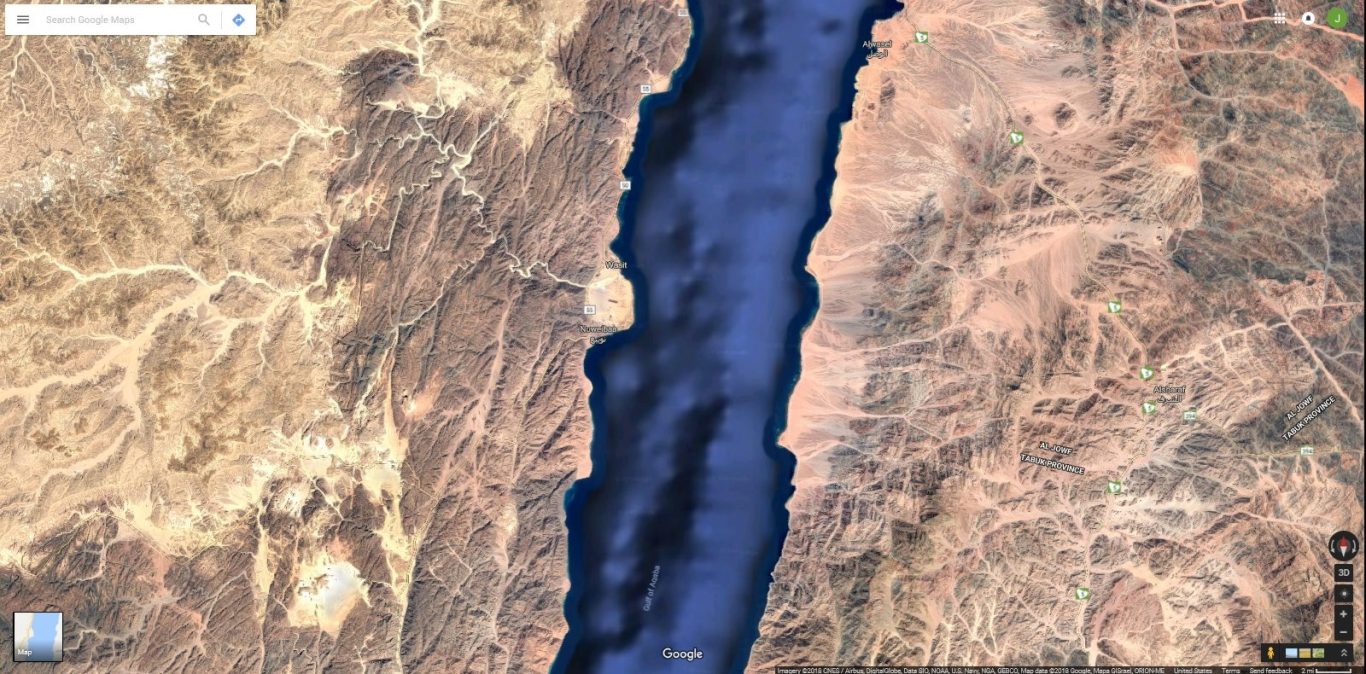
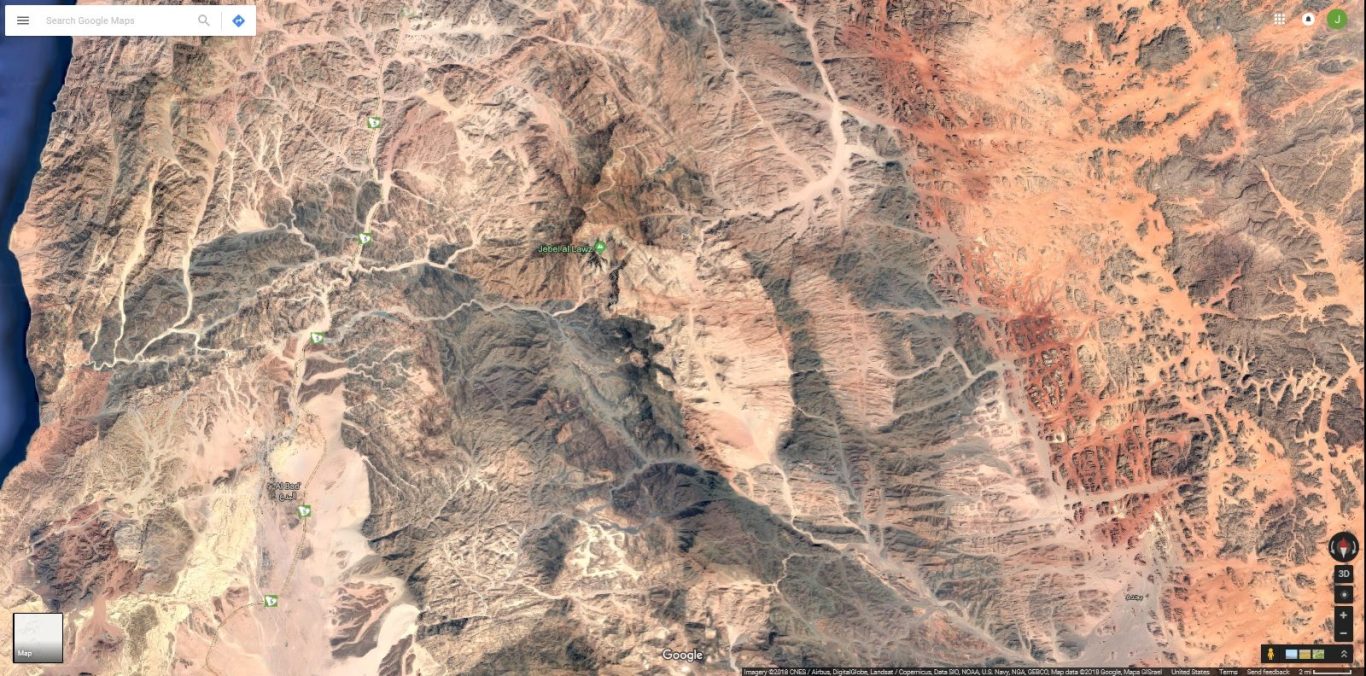


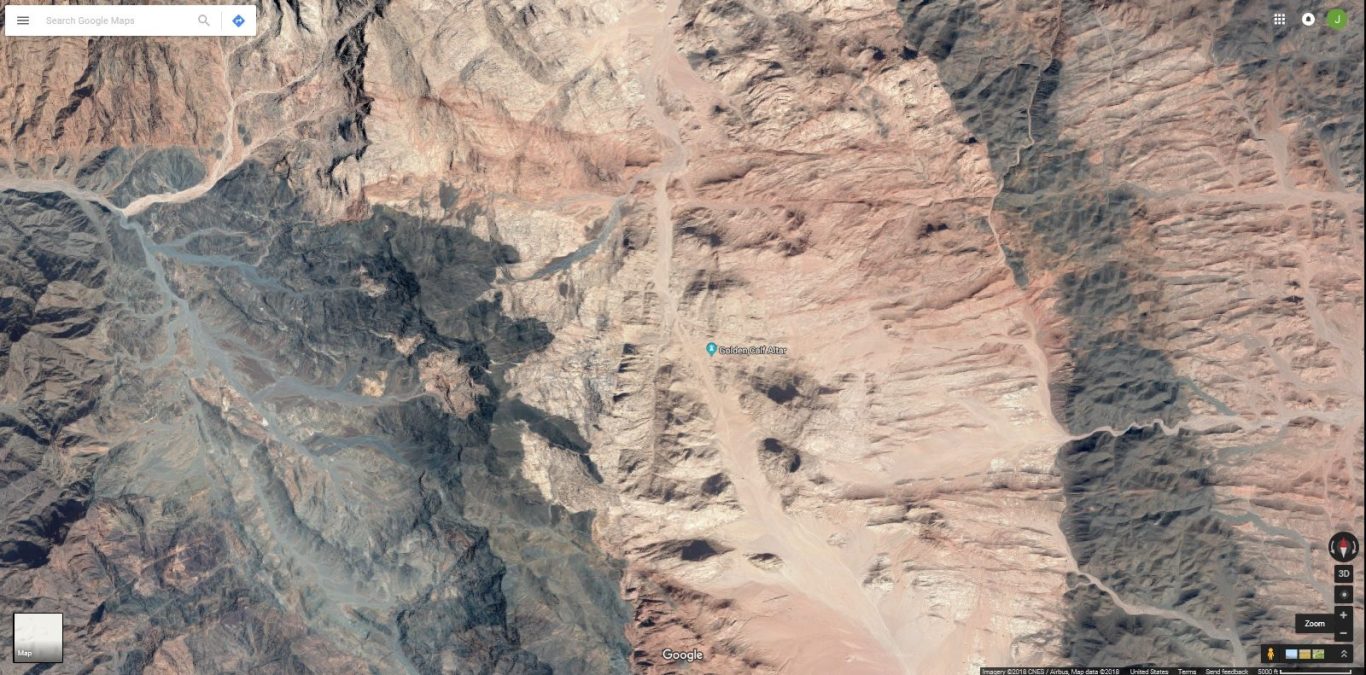







The late Ron Wyatt of The Wyatt Family Website and Ark Discovery International, and Jim and Penny Caldwell of Split Rock Research Foundation, and Rob Cornuke of Base Institute all agree that Mount Horeb is located in Midian, and is today in Saudi Arabia, and is known as Jebel al Lawz. The darkened top of the mountain is the area that hwhy came down and met Moses.


This is one of Ron Wyatt's personel at Jubal Al Lawz

This is located in the ancient land of Midian. You can see the guard post on the right edge of the person in the picture above.
These are more images of Mount Sinai and its area taken from differnt 360 degree views. These first images were taken from a mountain from a distance away
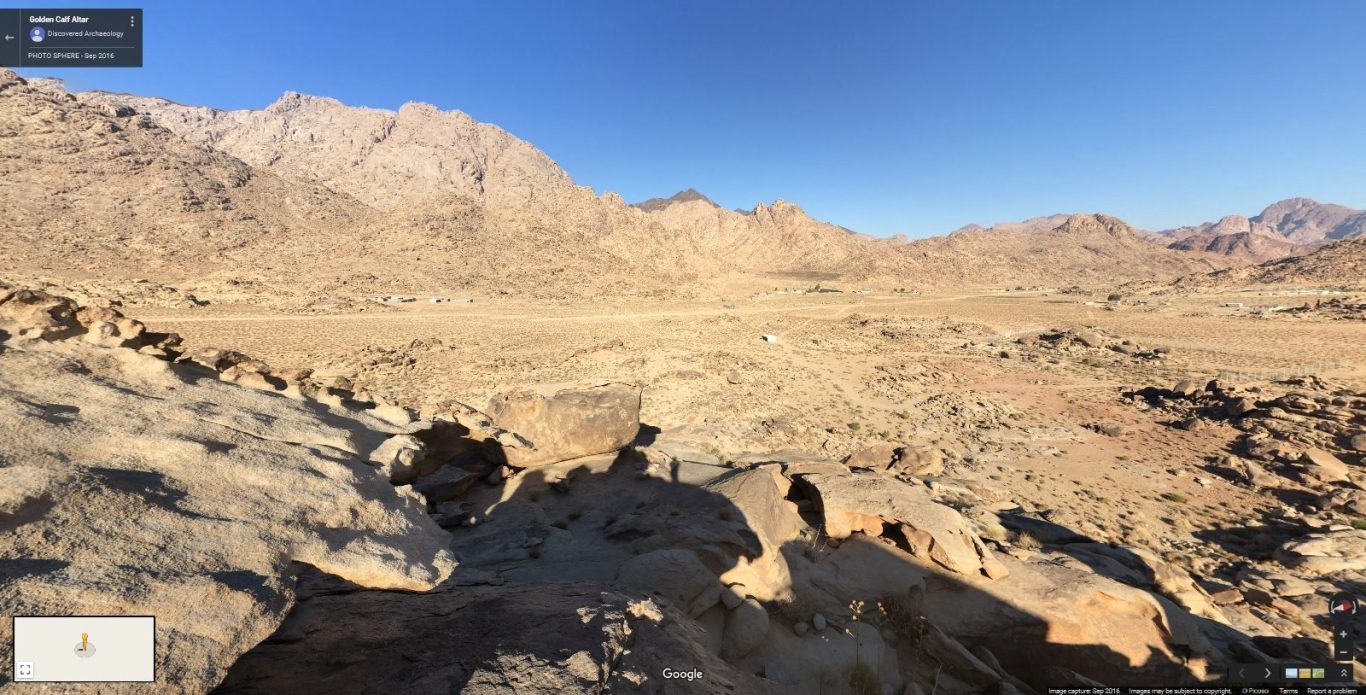
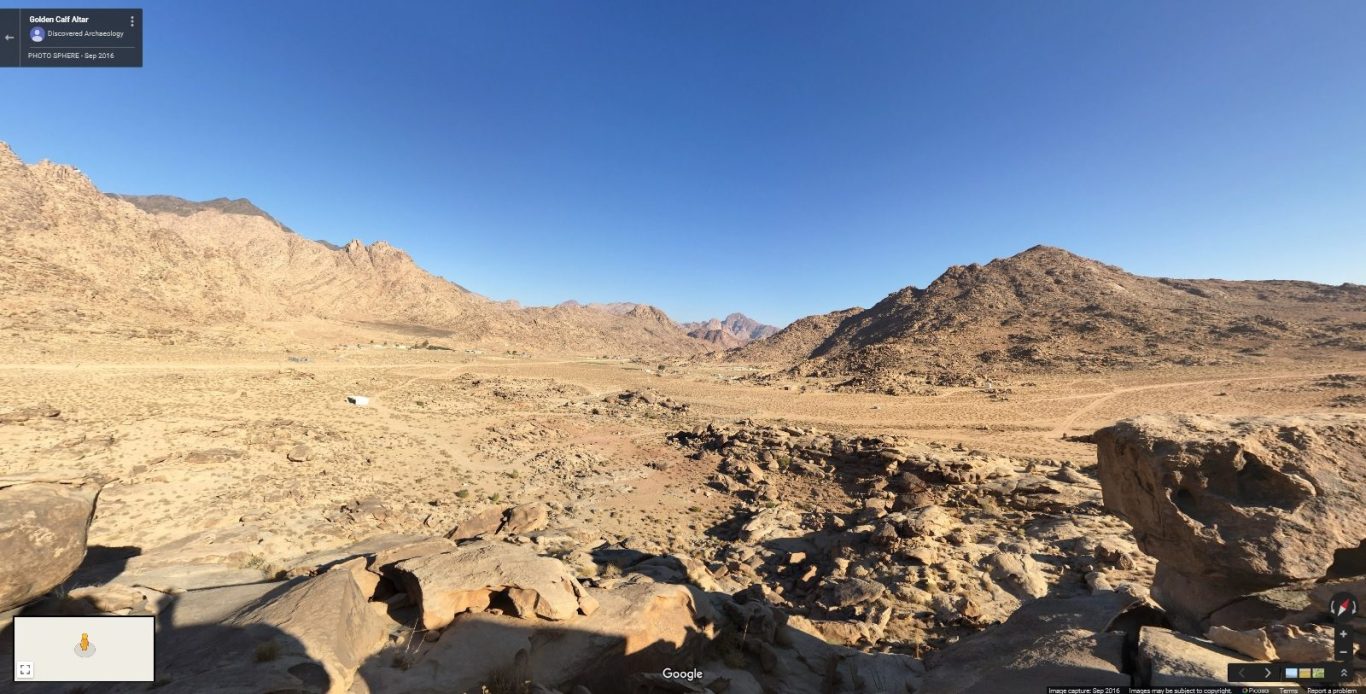



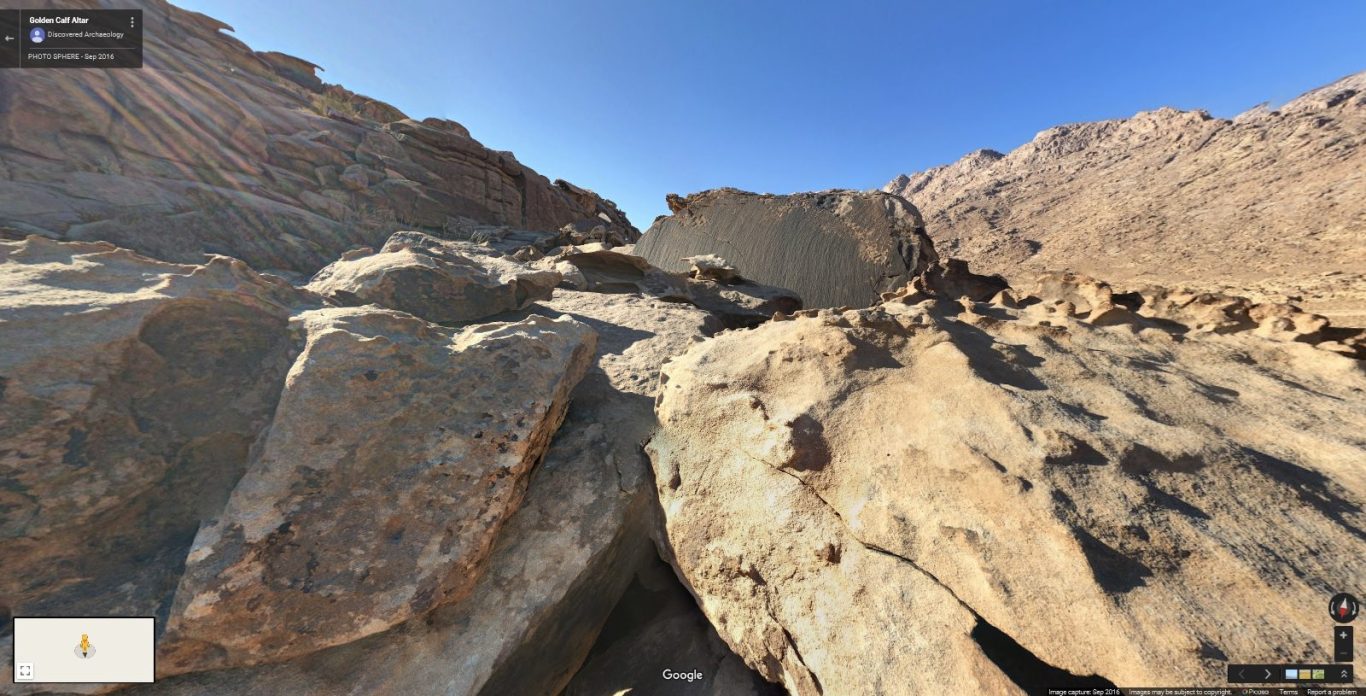








These next images below were also taken in a 360 degree view from the base of Mount Sinai



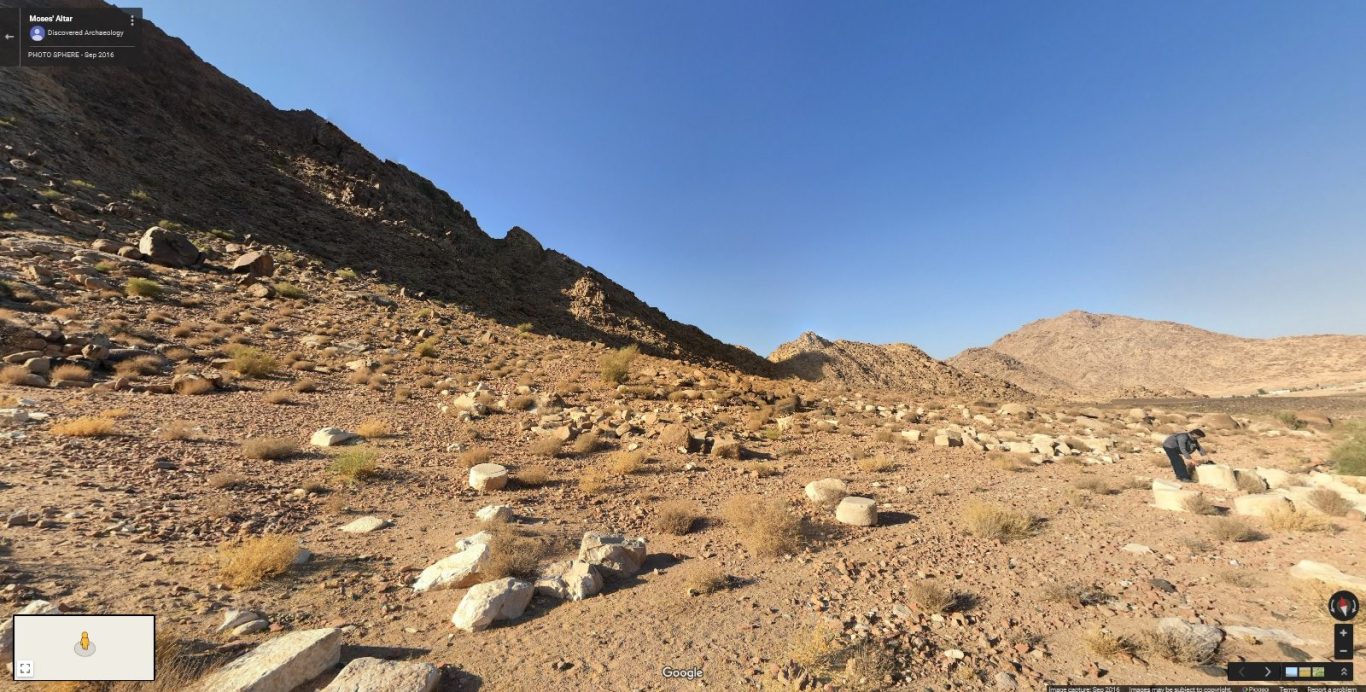
The mountain below on the right is where the first few images above were taken












Looking at the word SINAI
The Hebrew word for Sinai is "Seenai"- Samek, Yod, Nun, Yod (סיני). It is from Strong's Concordance number 5514, and its definition
Of uncertain derivation; Sinai, a mountain of Arabia: - Sinai.
It has no meaning. There is a word similar to it. It is the Hebrew word "s'neh"- Samek, Nun, Heh (סנה). It is from Strong's concordance number 5572, and its definition
From an unused root meaning to prick; a bramble: - bush.
It could also mean "shrub", and the word "prick" relates to a thorn bush. Recalling at the picture of Mount Sinai showing thorn bushes below

one can see little bushes level on the ground. This would be called "Mount Thorn Bush".
These are images of a bramble (thorn) bush


In my opinion, this would be the accurate defintion. The name of the region would be called "The Wilderness of the Thorn Bush". This is the same region where the mountain is located, where Moses saw "The Burning Bush". It is also noted in the Torah portion of Sh'moth, in the book of Exodus
Exodus 3:4 And יהוה saw when (for) had bent aside (turned aside) to see. And Elohim called to him from the midst of the bramble bush (thorn bush) (סנה), and said, Moses! Moses! And said, Behold I. 5 And said, Do you not draw near hither: Slip off your sandals from upon your feet, for the place which you are standing upon him, he is Sacred (Holy) Ground.
The Hebrew text for thorn bush in the Sh'moth portion's text is "hah-s'neh"- "the thorn bush" (הסנה), the same Strong's concordance number 5572 noted above.
These thorn bushes could likely be the same thorn bush branches that Yeshua wore on His head, resembling His kingship as King of the Jews, at the cross in Jerusalem, which is noted in the Gospel of John
John 19:2 And the soldiers platted a crown of thorns, and put it on His Head, and they put on Him a purple robe,... 5 Then came Yeshua forth, wearing the crown of thorns, and the purple robe. And Pilate saith unto them, Behold, the Man!
It is my opinion that the crown of thorns on Yeshua's head was symbolic sign to the Jewish People during Yeshua's time that it was Yeshua in the burning thorn bush at "the head" of Mount Sinai (Mount Thorn Bush) who spoke to Moses.
Before Moses went back to Egypt from Midian, in the Torah portion of Sh'moth, in the book of Exodus, Moses was at the mountain with יהוה to start his mission to lead the People out of Egypt, this was where יהוה was "pricking" Moses to start his new mission and occupation, based on the definition of Jethro's name, to save the People of Israel. This is comparable to my commentary in the Torah portion of Va-Y'khi, in the book of Genesis, when the Israelites were located at the threshing floor at Almah, before they crossed over to the land of Canaan to bury their father, Jacob, and the Egyptians stayed behind, which was the brothers' act to thresh out the Egyptians through the Thorn Trees (Almah). Similarly, this is what Moses is about to experience by being pricked from his previous occupation to his new "Kingdom Occupation". In this Torah portion's case, this is where Moses and the People will be "pricked" to be "spiritually married" to יהוה through this upcoming "Marriage Contract".
This is what the Heavenly Father does to us as believers in Yeshua in our lives by being "spiritually pricked" to begin our new "Spiritual Occupations" as believers in Yeshua, the Messiah, in our walk in Him, as well as being pricked to become "spiritually betrothed" to Yeshua when we become His "Spiritual Bride".
A REALIZATION!!!
Glory be to you Abba Father, יהוה, for revealing this. Zooming out, this is the image of the area of the Wilderness of Sinai and its vicinity

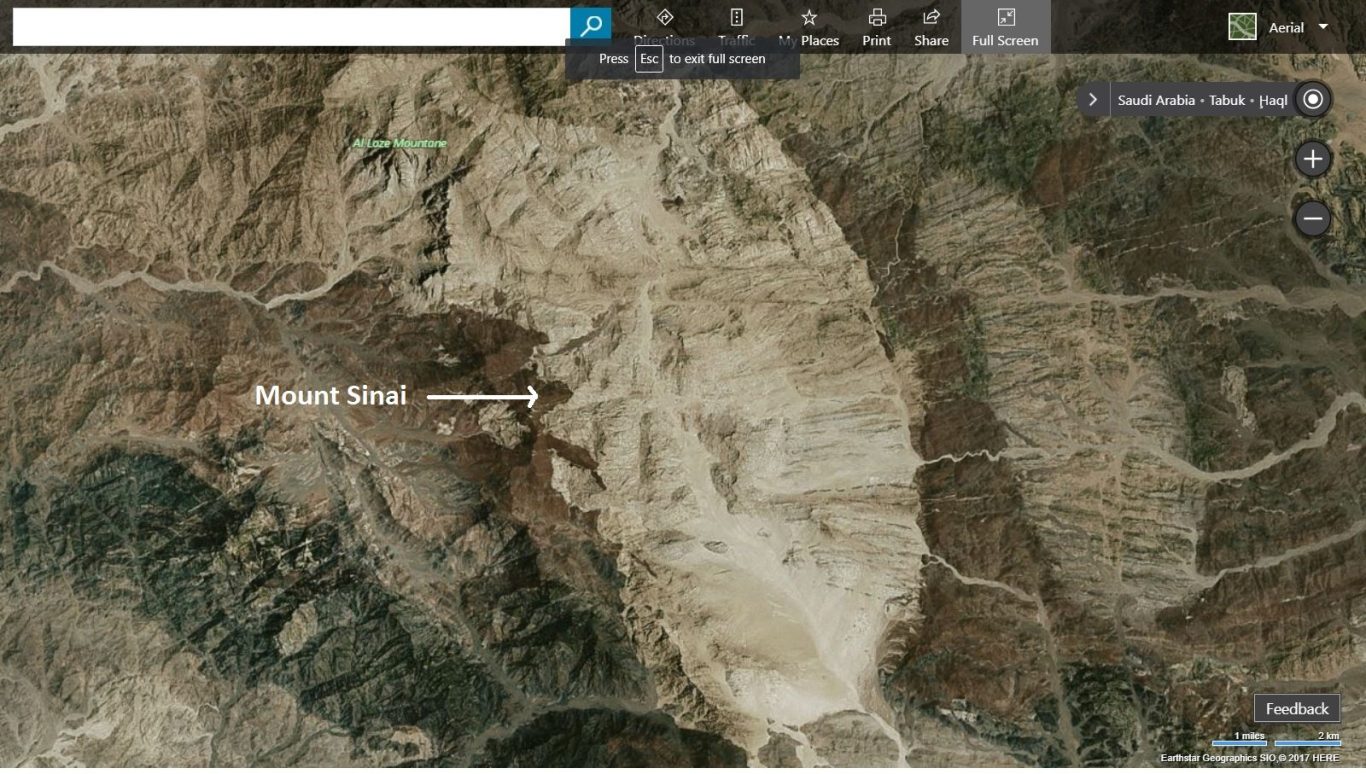
Looking into this circular area where Mount Sinai and the items related to Mount Sinai are located

Does this circular area look like something relating to a part of an organ of the human body? How about the top view of a brain? The path makes a separation between the two shaped type lobes, with the left lobe and the right lobe noted in the image below

This could reveal to us that the top of the head of the brain is יהוה's "Command Center of Intelligence" where the Israelites received the Ten Words (Commandments). This could also symbolically portray the top of the head of the Israelites male's "uncovered head", so that יהוה could be their covering, which is based in the apostle Paul's letter to the assembly in Corinth
1 Corinthins 11:3 But I would have you know, that the head of every man is Messiah; and the head of the woman is the man; and the Head of Messiah is יהוה.
4 Every man praying or prophesying, having his head covered, dishonoureth his head. 5 But every woman that prayeth or prophesieth with her head uncovered dishonoureth her head: for that is even all one as if she were shaven. 6 For if the woman be not covered, let her also be shorn: but if it be a shame for a woman to be shorn or shaven, let her be covered. 7 For a man indeed ought not to cover his head, forasmuch as he is the image and glory of hwhy: but the woman is the glory of the man.
Looking at an image of this chart below shows the different functions on both sides of the lobes of the brain

The left lobe is where our logic is located. This left lobe contains the locations of the border pillars that Moses set up at the base of Mount Sinai which is an act of keeping one in check, the altar of Moses which is an act of requirement, and the top of Mount Sinai where Moses received the Ten Words (Commandments) from יהוה which is an act of discipline. On the other hand, the right lobe is where our creativity is located, and this is the side where the Israelites used their creative skills to "create" the the golden calf. This is another satelite image showing both lobe sides with each of the locations in the Mount Sinai area showing the various points of interests

!!!כבד לך יהוה
Jim and Penny Caldwell of Split Rock Research Foundation have a new DVD out, titled "Exploring Arabia's Sinai", containing four hours of videos and pictures of the Real Mount Sinai of Jubal al Lawz. Click on the image below to go to the website for further information.
- - - - - - - - - - - - - - - - - - - - - - - - - - - - - - - - - - - - - - - - - - - - - - - - - - - - - - - - - - - - - - - - - - -
DISCLAIMER
The views and opinions expressed are solely those of the personnel and do not necessarily reflect the view or opinions of The Aleph-Tav Project.
- - - - - - - - - - - - - - - - - - - - - - - - - - - - - - - - - - - - - - - - - - - - - - - - - - - - - - - - - - - - - - - - - - -
JIM AND PENNY CALDWELL
Exploring Arabia's Sinai
In verse one, it reveals the time the Israelites arrived at Mount Sinai. It clearly states in verse one that it was "this day" in the third month that the Israelites left Egypt.
The question is "What day did the Israelites leave Egypt"? The answer is found in the Torah portion of Masei, in the book of Numbers
Numbers 33:3 And they pulled up (journeyed) from Rameses in the first renewed month, on the five ten (fiveteen, fifteen) day of the first renewed month; after the Passover, the Sons of Israel, they went out on a high hand to the eyes of all of the Egyptians.
They left Egypt on "the fifteenth day" of Aviv/Nissan. That was the first day of their journey in the wilderness.
Going back to this week's Torah portion's passage, the phrase "in this day" is the Hebrew phrase "bay-yohm hazeh" (ביום הזה), literally "on the day, the this", translated "on this day". An example of this phrase would be that someone would say "on the twentieth day on the month of July, a certain incident occurred on this day seven months ago", meaning that it occurred on January 20th. This is the same manner in verse one in this week's Torah portion. This verse was saying that the day they arrived at Mount Sinai was the same day they left Egypt. The day that the Israelites arrived at Mount Sinai was on the fifteenth day of the third month of Sivan. This means that it took the Israelites sixty days from the day they left Egypt to the time they arrived at Mount Sinai. It is now clear that their arrival to Mount Sinai did not traditionally occur before the Biblical Feast of Shavuoth (Pentecost), which occurs fifty days later during the period of the Feast of Unleavened Bread, between the fifteenth and twenty-first day of Aviv/Nissan.
CLICK HERE TO GO TO CONTINUE READING THIS WEEK'S TORAH PORTION
